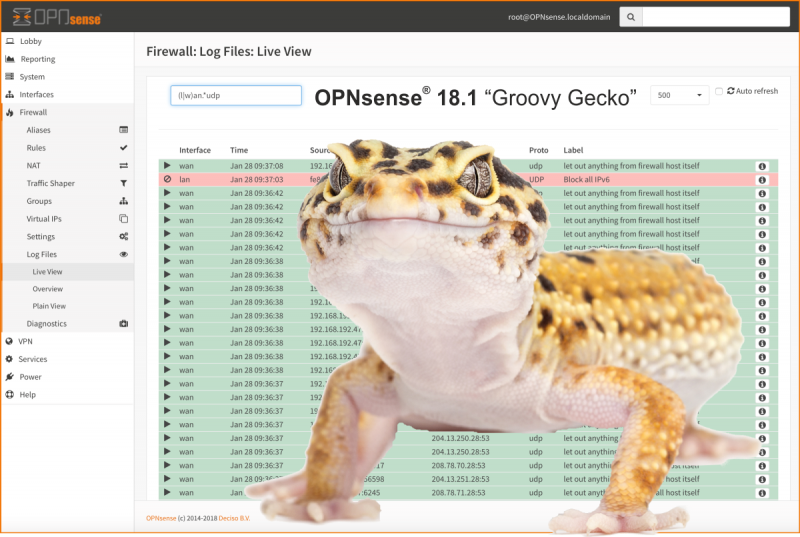
OPNsense® 18.1 Released
Hello good folks of the Internet,
For more than 3 years now, OPNsense is driving innovation through modularising and hardening the open source firewall, with simple and reliable firmware upgrades, multi-language support, HardenedBSD security, fast adoption of upstream software updates as well as clear and stable 2-Clause BSD licensing.
We humbly present to you the sum of another major iteration of the OPNsense firewall. Over the second half of 2017 well over 500 changes have made it into this release, nicknamed "Groovy Gecko". Most notably, the firewall NAT rules have been reworked to be more flexible and usable via plugins, which is going to pave the way for subsequent API works on the core firewall functionality. For more details please find the attached list of changes below.
The upgrade track from 17.7 will be available later today. Please be patient. 🙂
Meltdown and Spectre patches are currently being worked on in FreeBSD[1], but there is no reliable timeline. We will keep you up to date through the usual channels as more news become available. Hang in there!
These are the most prominent changes since version 17.7:
- FreeBSD 11.1, PHP 7.1 and jQuery 3 migration
- Realtek vendor NIC driver version 1.94
- Portable NAT before IPsec support
- Local group restriction feature in OpenVPN and IPsec
- OpenVPN multi-remote support for clients
- Strict interface binding for SSH and web GUI
- Improved MVC tabs and general page layout
- Shared forwarding now works on IPv6, in conjunction with "try-forwarding" and improved reply-to multi-WAN behaviour
- Easy-to-use update cache support for Linux and Windows in web proxy
- Intrusion detection alert improvements and plugin support for new rulesets (ET Pro, Snort VRT)
- Revamped HAProxy plugin with introduction pages
- Moved interface selection to menu and quick search for firewall rules, DHCP and wireless status
- Alias backend rewrite for future extensibility
- Plugin-capable firewall NAT rules
- Migration of system routes UI and backend to MVC (also available via API)
- Reverse DNS support for insight reporting (also available via API)
- Fully rewritten firewall live log in MVC (also available via API)
- New plugins: zerotier, mdns-repeater, collectd, telegraf, clamav, c-icap, tor, siproxd, web-proxy-sso, web-proxy-useracl, postfix, rspamd, redis, iperf, arp-scan, zabbix-proxy, frr, node_exporter
Download links, an installation guide[2] and the checksums for the images can be found below as well.
- Europe: https://opnsense.c0urier.net/releases/18.1/
- US East Coast: http://mirrors.nycbug.org/pub/opnsense/releases/18.1/
- US West Coast: https://mirror.sfo12.us.leaseweb.net/opnsense/releases/18.1/
- South America: http://mirror.upb.edu.co/opnsense/releases/18.1/
- South-East Asia: https://ftp.yzu.edu.tw/opnsense/releases/18.1/
- Full mirror list: https://opnsense.org/download/
Here is the full list of changes against version 18.1.r2:
- system: recover static version of PHP configuration files during boot
- system: show warning dialog when editing web GUI listening interfaces
- system: allow dots in certificate details
- system: remove workaround for new 32 bit mmap disallow default (see below)
- firewall: fix port range forward expansion
- firewall: move alias directory to persistent memory
- firewall: fix alias resolve during boot
- firewall: revert VIP gateway option for PPPoE interfaces
- interfaces: fix header link in list widget
- interfaces: defer IP renewal during boot
- installer: full password recovery mode enables user and sets local authentication
- installer: prevent MFS transition on install media after import
- network time: use all our time servers and prefer the first
- ui: revert menu positioning improvements
- plugins: os-freeradius 1.5.1 adds LDAP search filter (contributed by Michael Muenz)
- plugins: os-haproxy 2.4[3] (contributed by Frank Wall)
- plugins: os-node_exporter 1.0 (contributed by David Harrigan)
- plugins: os-postfix 1.0 (contributed by Michael Muenz)
- plugins: os-rspamd 1.0 (contributed by Fabian Franz)
- plugins: os-telegraf 1.2 adds graphite and graylog output (contributed by Michael Muenz)
- src: do not protect VLAN PCP write with the sysctl
- src: enable numbered user class ID option in dhclient
- src: set hardening.pax.disallow_map32bit.status=1 by default
- ports: ca_root_nss 3.35
- ports: libressl[4] 2.6.4
- ports: php[5] 7.1.13
- ports: sudo[6] 1.8.22
- ports: unbound[7] 1.6.8
All images are provided with SHA-256 signatures, which can be verified against the distributed public key:
# openssl base64 -d -in image.bz2.sig -out /tmp/image.sig
# openssl dgst -sha256 -verify rsa.pub -signature /tmp/image.sig image.bz2
The public key for the 18.1 series is:
-----BEGIN PUBLIC KEY-----
MIICIjANBgkqhkiG9w0BAQEFAAOCAg8AMIICCgKCAgEA5kMyxEWUoyY3y8JLlOnz
j2dE1QPYmWspn5Diqf1T6uSh0/HA8TwnRvI4m82dC2kgnafVB85zIS+rXQLiyJZI
JEqmBS5f54kVcyJPVORe7NepJq372amAMTcpPwH4b0SS9ZETebAOyuHjdG/lCjKD
yt5W5ZvaMiDMWLVuw1ZlTIxLgkRuCHsk66E1bdoiIMdZPoyk2Q9WQd3PynLRBVHC
iT32cJ/NlHiLEALp0wcNr+FllmFQXahQ5R1uBcsE/IXa7Tg0QXlW7s5+d6NTwQ/d
7NVnfZzH8IiO0A/9O5jbBsD6HLmity5nMI+RBwFQ9OQoBNxl5aakkusizT6diMYb
PG+zPZsWo/ADqsbg1U/MMLJXD8CDFjcerhIDrrWSIVlSmQKw97nMK/TdUsqnVl7N
uDLl0RHe+N6ndmNGTQGg5HbrTmYKSEGBdS4xFtO60JCxubzfpvnkDnPCIJtxWukf
TzhORJHj2vkGLDA5FocTSOY76lWUO4qJQBA2bB3GtGbCm/nM4TlHpL4Kbf10IUJk
j1tRFi8gXNOhrdplFAR+lV/yy58/+ZOg61Yz7UvYG/A9rxGkyVmIjzB/4S6Wstye
IA6vpfzHwHq82hMqafCSB2KJciuKVEgVO6DHLV03VLTPqkJVsCbWXHgNjK2fQCFX
JeXNX68TcObIJzqbiegZYo8CAwEAAQ==
-----END PUBLIC KEY-----
Stay safe,
Your OPNsense team
--
[1] https://lists.freebsd.org/pipermail/freebsd-security/2018-January/009719.html
[2] https://docs.opnsense.org/manual/install.html
[3] https://github.com/opnsense/plugins/pull/483
[4] https://ftp.openbsd.org/pub/OpenBSD/LibreSSL/libressl-2.6.4-relnotes.txt
[5] http://nl1.php.net/ChangeLog-7.php#7.1.13
[6] https://www.sudo.ws/stable.html#1.8.22
[7] http://www.unbound.net/download.html
SHA256 (OPNsense-18.1-OpenSSL-dvd-amd64.iso.bz2) = 3988c506c818c0861bb9beb38166123e9aca0814c0ef508779c1ebe9a8400c9c
SHA256 (OPNsense-18.1-OpenSSL-nano-amd64.img.bz2) = ab284cfd62f095b8f745604099ee8b4f0b5cda06ec67ec72a3ffa921328635d5
SHA256 (OPNsense-18.1-OpenSSL-serial-amd64.img.bz2) = 31eb6f7c44126258eb1b062d44dd92b1b0e3ebf57777c899f2df8858e5321b13
SHA256 (OPNsense-18.1-OpenSSL-vga-amd64.img.bz2) = 714b347c3c62a9a1178f0b77661fa7e7ad8b0d06c1e174af1085fda761639505
SHA256 (OPNsense-18.1-OpenSSL-dvd-i386.iso.bz2) = 10d27b8d0e5b4dde46be413088440db47e49f4eea3de53cc7339976c6471d26a
SHA256 (OPNsense-18.1-OpenSSL-nano-i386.img.bz2) = 5c4289940f4c7f03eaf4c00d3b673bc85cb366a5f12334d00d19183dbafc221b
SHA256 (OPNsense-18.1-OpenSSL-serial-i386.img.bz2) = ff63e759cdab3960119db159141a96f7e98ed0a427621585edc8362b9abf7a33
SHA256 (OPNsense-18.1-OpenSSL-vga-i386.img.bz2) = c43712c87a3381102d33f2606fc666fdffde54d81a0f0b8c70cf334eddd4047c
